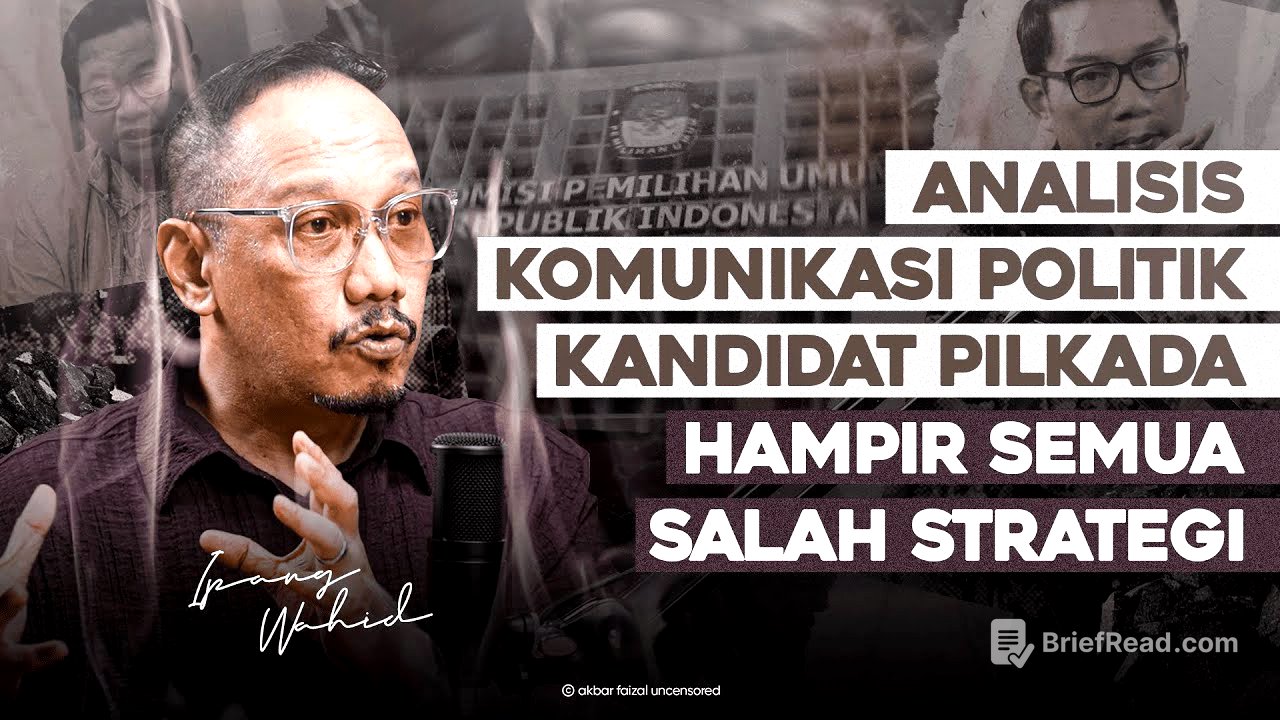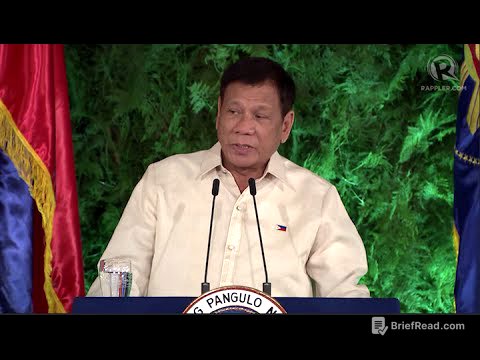TLDR;
In this episode of Akbar Faizal Uncensored, Akbar Faizal interviews Ipang Wahid, a perception engineer, to discuss the evolving landscape of political communication in Indonesia, especially in the context of the upcoming regional elections (Pilkada). They discuss the use of gimmicks, emotional appeals, and social media strategies in political campaigns, as well as the importance of understanding voter behavior and tailoring messages to specific demographics. They also analyze several regional elections, including those in Jakarta, West Java, Central Java, East Kalimantan, Banten, and North Sumatra, highlighting the key issues and communication strategies employed by the candidates.
- The importance of emotional connection with voters over purely rational arguments, especially close to election day.
- The effectiveness of social media campaigns, particularly TikTok, in reaching and influencing voters.
- The need for candidates to address relevant local issues and tailor their messages to specific demographics.
Introduction to Pilkada and the Evolution of Political Communication [1:12]
Akbar Faizal opens the discussion by noting that Indonesia is about to hold its fifth simultaneous Pilkada. He emphasizes that while political discourse often lacks substance, the field of political communication is constantly evolving, offering new approaches. He introduces Ipang Wahid, a communication expert, to provide insights into the current state of political campaigns and whether they are progressing or regressing in terms of substance and strategy.
The "Gemoy" Campaign and Perception Engineering [2:25]
Ipang Wahid reveals that he was involved in the "Gemoy" campaign for Prabowo, which aimed to shift Prabowo's image from militaristic to more approachable. He describes his role as a "perception engineer," focusing on managing and distributing content on social media. The "Gemoy" concept emerged organically after Prabowo's appearance on Mata Najwa, where his response "Biarkan saya menjawab" (Let me answer) was perceived as endearing. Ipang's team tested the "Gemoy" concept on social media, and it quickly went viral. To complement the "Gemoy" image, they created cartoon characters of Prabowo and Gibran, which were used on billboards and became a global phenomenon, even featured in international media.
The Importance of Gimmicks and Emotional Appeals in Campaigns [6:59]
Ipang Wahid explains that Prabowo recognized the public's preference for gimmicks over complex policy details. Data showed that the public was most interested in Prabowo's free lunch program and industrial downstreaming policies. Ipang emphasizes that his role is to win elections, not necessarily to educate the public. He acknowledges that while gimmicks can be effective, campaigns should avoid overusing them and losing sight of substance. He notes that political marketing changes rapidly, requiring constant adaptation.
Pilkada Strategies: Awareness, Capability, and Electability [10:41]
Ipang Wahid outlines four key elements for winning elections: awareness, capability, electability, and isitas (emotional connection). He argues that while campaigns should ideally be educational, the primary goal is to win. He notes that people are drawn to gimmicks, but overdoing it can be tiring. He stresses the importance of tailoring campaign programs to the needs of the target voters, using the example of Prabowo's focus on the free lunch program.
Rational vs. Emotional Factors in Voter Choice [14:39]
Ipang Wahid explains that voters make decisions based on rational and emotional factors. Rational factors include infrastructure and policy, while emotional factors include relatability and personal connection. He notes that in the final weeks before an election, emotional factors become dominant. He uses the example of Jakarta, where Jokowi's endorsement of a candidate and Anies's endorsement of another candidate are driven by emotional considerations.
Analyzing the Jakarta Pilkada: Ridwan Kamil vs. Prasetyo Edi Marsudi [16:37]
Akbar Faizal and Ipang Wahid discuss the Jakarta Pilkada, focusing on Ridwan Kamil (Emil) and Prasetyo Edi Marsudi (Pram). They analyze Emil's perceived blunders and whether Jokowi's endorsement can offset them. Ipang believes Jokowi's endorsement still holds weight, but less so than in Central Java. He notes that Jakarta's voters are more critical. Ipang highlights Pram's strengths, including his lack of enemies and his ability to appeal to voters who dislike Emil. They also discuss the Bobotoh (Persib Bandung fans) vs. Jakmania (Persija Jakarta fans) issue, which could affect Emil's chances.
Ridwan Kamil's Communication Strategy and Key Issues in Jakarta [20:35]
Ipang Wahid critiques Ridwan Kamil's communication strategy, suggesting he presents too many messages, causing confusion. He believes Pram's focus on traffic congestion is more relevant to Jakarta voters. Ipang identifies the top three issues in Jakarta as job creation, traffic, and flooding. He suggests that Emil should focus on leveraging his connections to the central government to boost Jakarta's economy and create jobs. Despite the Persija-Bobotoh issue, Ipang believes Emil has a good chance if he simplifies his message and focuses on relevant issues.
Final Advice for Ridwan Kamil and Analysis of West Java Pilkada [23:20]
Ipang Wahid advises Ridwan Kamil to focus on emotional appeals and avoid gimmicks in the final days of the campaign. He praises Pram's authenticity, which resonates with voters. He also notes that avoiding blunders is crucial. Turning to West Java, Ipang predicts a win for Dedi Mulyadi, citing his strong consistency and long track record. He recalls past efforts to prevent Ridwan Kamil from competing in West Java.
Analyzing Pilkada in Central Java, East Kalimantan, and Banten [26:08]
Ipang Wahid believes that Lutfi in Central Java has a better chance of winning than Ridwan Kamil in Jakarta due to Jokowi's strong influence. He notes that Andika Hendrar Priadi is gaining ground in Central Java. He considers the Jakarta and Central Java races more interesting than those in West Java and East Java, which seem more predictable. In East Kalimantan, he discusses the incumbent Isran Noor and his challenger Rudi Masud. He criticizes Isran's performance in debates, which could hurt his chances. He also highlights the importance of addressing the low education levels and high APBD in East Kalimantan.
Banten Pilkada and Communication Strategies in Sumatera Utara [34:16]
Ipang Wahid discusses the Banten Pilkada, noting that Andra Soni's focus on free education is a good strategy, but it's important to know if education is a top issue for Banten voters. He praises Andra's communication skills compared to Ridwan Kamil. He acknowledges that Airin Rachmi Diany has a strong political base due to her long-term engagement with the community. Moving to North Sumatra, Ipang believes Bobby Nasution has better communication skills than Edy Rahmayadi. He praises Bobby's articulation, public speaking, and structured approach in debates.
The Role of Social Media and Emotional Connection in Campaigns [40:43]
Ipang Wahid emphasizes the increasing importance of social media in campaigns, noting that people are constantly exposed to it. He explains the concept of "EB testing" to create viral content. He stresses that emotional connection is key, even when presenting rational arguments. He uses the example of the "janda" (widow) issue and the importance of capitalizing on emotional moments. He also discusses the importance of setting KPIs for social media campaigns, such as targeting a certain number of views per month.
The Impact of Debates and Building Credibility [43:52]
Ipang Wahid believes that debates contribute only a small percentage to a candidate's rise in polls. He criticizes candidates who are overly technical and lack substance in their presentations. He suggests that campaign teams should capture key moments from debates and create real-time content for social media. He praises Ridwan Kamil's team for using LED displays during his vision and mission presentation, which helped build credibility.
Conclusion: The Future of Leadership and the Importance of Relevance [46:53]
Akbar Faizal and Ipang Wahid conclude by discussing the possibility of unqualified leaders winning elections through gimmicks. Ipang believes that voters are not easily fooled and that relevance is key. He expresses confidence in Khofifah Indar Parawansa's chances in East Java due to her track record and communication skills. He also discusses the Pilkada in Jambi and Lampung, where incumbents are facing challenges. He emphasizes the importance of communication skills and relevance in today's political landscape.








